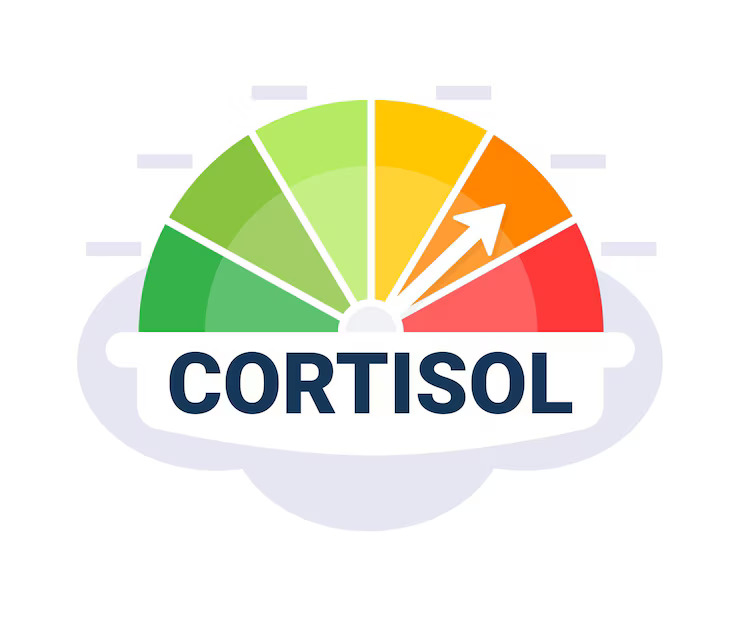
Thursday, 25 July, 2024
What is Cortisol? Known as the "stress hormone," it is essential for controlling your body's reactions to stress and other physiological processes. It aids in controlling the sleep-wake cycle, lowering inflammation, and regulating metabolism. This article will delve into the importance of cortisol, its effects on your health, and how you can manage its levels to maintain a balanced lifestyle. Understanding how to reduce cortisol levels can significantly enhance your well-being.
Overview of Cortisol: Definition and Basic Function
Cortisol is a steroid hormone produced by the adrenal glands, located atop your kidneys. It emphasizes the significance of controlling stress and implementing stress management strategies for preserving general health and well-being. Understanding cortisol and stress is essential for recognizing how your body reacts under pressure.
Importance of Cortisol: Role in Daily Health and Well-Being
Cortisol aids in blood sugar regulation, metabolic control, and inflammation reduction in addition to its function in the stress response. It emphasizes how crucial it is to control stress and develop methods for stress management to preserve overall wellness and health.
The Science of Cortisol
Production and Regulation: How and Where Cortisol is Produced in the Body
Cortisol is synthesized in the adrenal cortex under the regulation of the hypothalamus and pituitary gland in the HPA axis (hypothalamic-pituitary-adrenal axis). Proper functioning of this system is crucial for maintaining balanced cortisol levels.
Cortisol's Mechanism of Action: How Cortisol Affects Cells and Organs
Once produced, cortisol travels through the blood and binds to glucocorticoid receptors found in nearly every cell, influencing the cell's function—from glucose metabolism to immune response. Understanding this mechanism can help in identifying the causes of elevated cortisol.
Circadian Rhythm and Cortisol: Understanding the Daily Fluctuations of Cortisol Levels
Throughout the day, cortisol levels change, reaching their high in the early morning and progressively declining by the evening. Your general health, vitality, and mood are all impacted by this natural pattern. Cortisol homeostasis requires a healthy circadian rhythm to be maintained.
Cortisol and Stress
Connection to Stress: How Cortisol is Related to Stress
During stressful situations, the body ramps up cortisol production to boost energy and ensure survival, showcasing its direct link to stress management. Recognizing this connection can guide you in how to manage stress effectively.
Physical Effects of Stress on the Body: How Stress Modifies Cortisol Levels
Chronic stress can lead to sustained high levels of cortisol, which disrupts natural functions and can lead to health issues. Understanding these physical effects can help in finding natural ways to reduce cortisol.
Psychological Impact: Stress and Its Mental Health Implications
Elevated cortisol levels may impact brain chemistry, resulting in symptoms of elevated cortisol levels such as anxiety, depression, and other mental disorders. Understanding these psychological effects highlights the importance of learning efficient stress-reduction strategies.
Health Implications of Cortisol Imbalance
Hyperfunction: Effects of Elevated Cortisol Levels
- Chronic Conditions: Persistent high cortisol levels are linked to conditions like hypertension, type 2 diabetes, and osteoporosis. Treatment for high cortisol often involves lifestyle changes and medical interventions.
- Mental Health Issues: It can lead to anxiety disorders, depression, and irritability.
- Impact on Physical Appearance: You might notice weight gain, particularly around the abdomen, face, and neck, as well as acne and other skin changes. Recognizing the symptoms of low cortisol levels in the body can help in early diagnosis.
Hypofunction: Effects of low Cortisol Levels
- Adrenal Insufficiency: This can manifest as fatigue, muscle weakness, and weight loss.
- Immune System Compromise: Low cortisol levels may impair your immune response, making you more susceptible to infections.
- Energy Fluctuations: You might experience severe fatigue, low energy, and muscle weakness. Understanding the causes of low cortisol levels in the body is important for early diagnosis and treatment.
Managing Cortisol Levels for Better Health
Dietary Approaches: Foods That Help Balance Cortisol
- Nutrients That Help: Include vitamins C, B vitamins, and magnesium in your diet to help regulate cortisol production. A well-structured cortisol diet plan can significantly impact your cortisol levels.
- Foods to Avoid: High sugar and high-fat foods can spike cortisol levels unnecessarily.
Lifestyle Modifications: Practices to Maintain Healthy Cortisol Levels
- Exercise: Regular physical activity can help regulate cortisol, but intense exercise can temporarily increase its levels.
- Sleep: Ensuring you get enough quality sleep is crucial in maintaining healthy cortisol levels. Adopting lifestyle changes is a key strategy in how to balance cortisol levels.
Stress Management Techniques: Effective Strategies to Control Stress
- Mindfulness and Relaxation: Techniques like yoga, meditation, and deep-breathing exercises can reduce stress.
- Professional Help: Don't hesitate to seek help from a therapist or counselor if stress becomes overwhelming. Implementing stress management techniques is fundamental in how to reduce cortisol levels.
Cortisol Testing and Treatment Options
- Diagnosing Cortisol Imbalance: If you suspect an imbalance, consult with a healthcare provider. Understanding cortisol testing and seeking appropriate cortisol imbalance treatment is vital for maintaining health.
- Testing Methods: Cortisol levels can be tested through saliva, blood, or urine. It's essential to choose the best way to test cortisol levels for accurate diagnosis.
- Treatment and Management: Depending on the cause, treatment may include lifestyle changes, medication to reduce cortisol, or other therapies.
Conclusion
Understanding and managing cortisol is key to maintaining not only mental health but also overall physical health. By recognizing the signs of imbalance and taking steps to manage stress, you can help keep your cortisol levels in check and enhance your quality of life.
FAQs
What is cortisol and why is it important?
Cortisol is a steroid hormone produced by the adrenal glands that helps regulate metabolism, reduce inflammation, and control the sleep-wake cycle. It is crucial for managing the body's stress response and maintaining overall health.
How can I tell if my cortisol levels are not balanced?
You can tell if your cortisol levels are not balanced by observing symptoms such as persistent fatigue, weight gain, especially around the abdomen, mood swings, high blood pressure, and disrupted sleep patterns. Testing through saliva, blood, or urine can provide more definitive confirmation.
Are there specific times of the day when cortisol levels peak?
Yes, cortisol levels typically peak in the early morning, shortly after waking up. This natural peak helps to provide energy for the day ahead.
How do cortisol levels affect sleep?
Cortisol levels can affect sleep by influencing your ability to fall asleep and stay asleep. Elevated cortisol levels, especially in the evening, can lead to difficulty falling asleep or disrupted sleep patterns.
Can cortisol levels affect weight loss or gain?
Yes, cortisol levels can affect weight loss or gain. Elevated cortisol levels, particularly over an extended period, can contribute to weight gain, especially around the abdomen. Cortisol influences metabolism and can lead to increased appetite and cravings for unhealthy, high-calorie foods, which may further contribute to weight gain.
What are some natural ways to reduce cortisol levels?
Natural ways to reduce cortisol levels include regular exercise, mindfulness practices like meditation and yoga, ensuring adequate sleep, maintaining a healthy diet, limiting caffeine intake, and spending time in nature. These strategies can help manage stress and promote balanced cortisol levels for overall well-being.
Author doctor name
Consultant - Endocrinologist & Diabetologist
MBBS MD DM


 Neurosciences
Neurosciences Bariatric Surgery
Bariatric Surgery